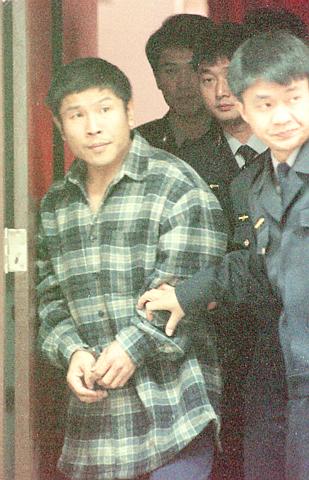Taiwan's most notorious criminal, Chen Chin-hsing (
Prosecutor Chang Hwei-chiung (
Despite previous media reports yesterday that Chen might be executed as early as last night, the order had not reached Yeh's office as of yesterday afternoon.

PHOTO: LU CHUN-WEI, LIBERTY TIMES
Chen's case has been marred by disputes over the validity of the law applied to his case. Human rights groups and some legal experts argue that the Act for the Control and Punishment of Banditry (懲治盜匪條例), commonly known as the "bandit law," violates basic human rights and is no longer valid. They say that the government has repeatedly ignored one article of the 1944 law requiring its annual renewal to stay in effect.
However, the legislature, the Ministry of Justice, and the Supreme Court all recently concluded that the law is still in effect.
As the legal debate continues, Yeh has yet to order executions of nine others convicted under the law, including the famous Hsichih trio, who many lawyers believe have been wrongly convicted.
Chen and two accomplices plunged Taipei into a security nightmare in April 1997 when they kidnapped the 17-year-old daughter of entertainer Pai Ping-ping (白冰冰). Together with Lin Chun-sheng (林春生) and Kao Tien-min (高天民), Chen was on the run from police for seven months after kidnapping and beating the girl to death.
The case triggered public anger over the government's perceived inability to stem deteriorating social order. The outrage culminated in street demonstrations in May 1997, when tens of thousands of people demanded the resignation of then-premier Lien Chan (連戰).
While on the run, Chen and his gang committed two more kidnappings and a grisly triple murder at a plastic surgeon's clinic in October. Lin and Kao were eventually killed in separate shootouts with the police. Chen, meanwhile, later admitted to having preyed on many young women living alone in Taipei and raping them.
The drama ended in November when Chen broke into the residence of the South African military attache and held his family hostage for 24 hours before surrendering.
While on death row, Chen handed a 50,000-character confession to a Christian group. The Ministry of Justice reacted strongly to the group's plan to have his confessions published. The group has postponed the publication.

SECURITY: As China is ‘reshaping’ Hong Kong’s population, Taiwan must raise the eligibility threshold for applications from Hong Kongers, Chiu Chui-cheng said When Hong Kong and Macau citizens apply for residency in Taiwan, it would be under a new category that includes a “national security observation period,” Mainland Affairs Council (MAC) Minister Chiu Chui-cheng (邱垂正) said yesterday. President William Lai (賴清德) on March 13 announced 17 strategies to counter China’s aggression toward Taiwan, including incorporating national security considerations into the review process for residency applications from Hong Kong and Macau citizens. The situation in Hong Kong is constantly changing, Chiu said to media yesterday on the sidelines of the Taipei Technology Run hosted by the Taipei Neihu Technology Park Development Association. With

A US Marine Corps regiment equipped with Naval Strike Missiles (NSM) is set to participate in the upcoming Balikatan 25 exercise in the Luzon Strait, marking the system’s first-ever deployment in the Philippines. US and Philippine officials have separately confirmed that the Navy Marine Expeditionary Ship Interdiction System (NMESIS) — the mobile launch platform for the Naval Strike Missile — would take part in the joint exercise. The missiles are being deployed to “a strategic first island chain chokepoint” in the waters between Taiwan proper and the Philippines, US-based Naval News reported. “The Luzon Strait and Bashi Channel represent a critical access

‘FORM OF PROTEST’: The German Institute Taipei said it was ‘shocked’ to see Nazi symbolism used in connection with political aims as it condemned the incident Sung Chien-liang (宋建樑), who led efforts to recall Democratic Progressive Party (DPP) Legislator Lee Kun-cheng (李坤城), was released on bail of NT$80,000 yesterday amid an outcry over a Nazi armband he wore to questioning the night before. Sung arrived at the New Taipei City District Prosecutors’ Office for questioning in a recall petition forgery case on Tuesday night wearing a red armband bearing a swastika, carrying a copy of Adolf Hitler’s Mein Kampf and giving a Nazi salute. Sung left the building at 1:15am without the armband and apparently covering the book with a coat. This is a serious international scandal and Chinese

COUNTERINTELLIGENCE TRAINING: The ministry said 87.5 percent of the apprehended Chinese agents were reported by service members they tried to lure into becoming spies Taiwanese organized crime, illegal money lenders, temples and civic groups are complicit in Beijing’s infiltration of the armed forces, the Ministry of National Defense (MND) said in a report yesterday. Retired service members who had been turned to Beijing’s cause mainly relied on those channels to infiltrate the Taiwanese military, according to the report to be submitted to lawmakers ahead of tomorrow’s hearing on Chinese espionage in the military. Chinese intelligence typically used blackmail, Internet-based communications, bribery or debts to loan sharks to leverage active service personnel to do its bidding, it said. China’s main goals are to collect intelligence, and develop a